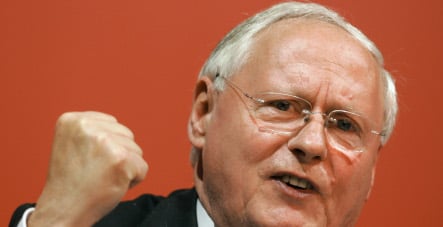You ever heard of Oskar Lafontaine? He’s this sort of cartoonishly outraged blowhard, whose wacky economic ideas would be entertaining if he weren’t the head of Germany’s fastest-growing political party. His posse, the Left party, has a platform as unimaginative and populist as its title.
In this period of economic chaos that has brought the global capitalist order crashing down around us, wannabe commie Oskar thought it appropriate to point his demagoguery at German industrial matriarch Maria-Elizabeth Schaeffler. Her family’s company this summer paid about €10 billion for yet another German industrial empire, a tyre maker named Continental. Frau Schaeffler, Oskar said, could never have earned €10 billion on her own – as if to say €10 billion is more than any human could ever need.
Fair enough, you have to think. Oschi (as I like to call him) has a point. Nobody really does need that much cash.
But then he played ideological hairstylist to quickly fashion something that looked like a philosophical mullet – hip and retro, maybe, but still ugly: he suggested the German government take away Schaeffler’s company and her money. Make it a state-owned company. Nationalize it à la Hugo Chavez. Distribute the wealth. Then he added some brassy highlights about communists and East Germany and, well, Oskar gets boring pretty quick – which is why you may have never heard of him.
Naturally, everyone who isn’t in Oschi’s party chuckled because the world’s financial markets are crumbling and we need something to laugh about. But apparently the laugh is on us taxpayers, because guess what George W. Bush has come up with to solve this financial mess?
The commander in chief of cowboy capitalism has decided to make the world’s largest insurer a state-owned company. Apparently, it’s not just great minds that think alike.
But while dudes like Oschi get to talk about how nice the world would be without rich people, and dudes like George prove his point, the rest of us get to sit around wondering where this financial fuss will leave us normal folk in Germany. As the occasional financial hack and someone who has lived through a handful of recessions, I can say with confidence: pretty much where we are today.
Complain all you want about the fiscally conservative Germans and their heavy-handed regulations, but they’re exactly what’re going to save middle class expats such as myself during what is almost certainly already a recession. It’s not that the country hasn’t been affected by this morass of global greed – two of the government’s own mid-sized banks had to be saved from bankruptcy – but that was probably the worst for this economy.
Why?
Because while most Americans think financial planning means moving hefty credit card balances from their Visa to their MasterCard, Germans see opening a savings account as an advanced form of investment. While the Brits and Americans begin looking for a buyer for their house the second they close, Germans see property purchases as a risky, almost speculative bet. Homeownership here is the kind of thing all your good friends warn you away from (I speak from experience). Why buy when you can rent?
All of this fear has kept the majority of German banking accounts at financial institutions like Sparkasse that are not only owned to varying degrees by the government, but also tightly controlled – Angie’s boys won’t let them do much with that cash but tuck it under the mattress. The one percent or two percent that spills over the side is returned as interest. To a German, that’s an investment yield of a lifetime.
On top of that, most of Germany’s businesses don’t make big headlines, they make big factories. Spinning machines, paper mills and hydraulic presses. They’re owned by families, not unlike Ms Schaeffler’s, that aren’t very interested in investors or politicians, of either the Lafontaine or Bush ilk. Collectively, they’re known as the Mittelstand, mid-sized companies that have made Germany the world’s export champion. They like to keep their companies and their wealth in the family, if you will.
Sure, expats such as myself are a little more exposed to this current debacle since we likely have economic links outside Germany. But to keep it all in perspective, I just like to refer to the last time rich people caused economic mayhem by getting greedy – the dotcom bubble. What was your life like during that recession? Me? I got laid off and my equally unemployed girlfriend ended up pregnant. Life was pretty good.
So until Lafontaine becomes chancellor and starts nationalizing Germany’s Mittelstand I’m not going to sweat the financial catastrophes keeping the fat cats on Wall Street up at night.
Since a good German Stammtisch is a place where pub regulars come to talk over the issues of the day, Portnoy welcomes a lively conversation in our Discuss section.



 Please whitelist us to continue reading.
Please whitelist us to continue reading.